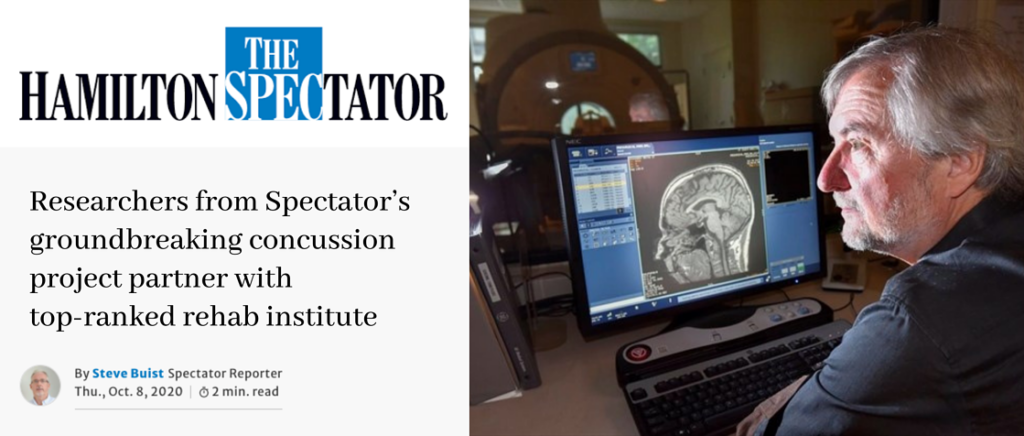[ale_divider style=”thin” text=”notext”] Divider Text [/ale_divider]
This article appeared on the spectator.com by Steve Buist. To read the original post Click Here.
[ale_divider style=”thin” text=”notext”] Divider Text [/ale_divider]
Members of Collision Course team will do EEG testing and cognitive assessments for Toronto Rehabilitation Institute
Researchers who were part of The Spectator’s groundbreaking CFL concussion project have signed a key collaboration agreement with one of the world’s leading rehabilitation institutes.
VoxNeuro, a startup company that came out of McMaster University, will be conducting neurophysiological testing and cognitive health assessments of concussion patients at the Hull-Ellis Concussion and Research Clinic, which is part of the Toronto Rehabilitation Institute.
VoxNeuro, which has its headquarters at McMaster Innovation Park, was founded by John Connolly, a McMaster professor and the Senator William McMaster Chair in Cognitive Neuroscience, who specializes in electroencephalogram (EEG) analysis and concussions.
The company’s partnership with the Toronto Rehabilitation Institute is expected to last at least a year.
“It is a great place to be associated with so we’re really thrilled,” said Connolly, who was part of The Spectator’s Collision Course project published in 2017.
The goal of the collaboration is to provide better quantitative diagnostic tools for assessing concussions so that clinicians don’t have to rely solely on questionnaires and behavioural tests, which are subjective and can vary greatly between patients.
Two people might have concussions of equal severity, for example, but perceive them quite differently depending on each person’s tolerance for pain and discomfort.

Concussion patients at the Hull-Ellis clinic will undergo some of the same EEG tests and cognitive assessments that were used during the Collision Course project.

Other members of the VoxNeuro team who were part of the The Spectator project include Kyle Ruiter and Rober Boshra, who has just received a post-doctoral fellowship at Princeton University.
The Collision Course series showed the shocking effects that concussions have on the brains of football players.
Using sophisticated brain imaging techniques, The Spectator team showed disturbing differences in brain functions between nearly two dozen retired CFL players and a group of similarly-aged men who had no histories of concussions.
For some of the retired players, the electrical responses in their brains were no different than responses seen in some types of coma patients.





